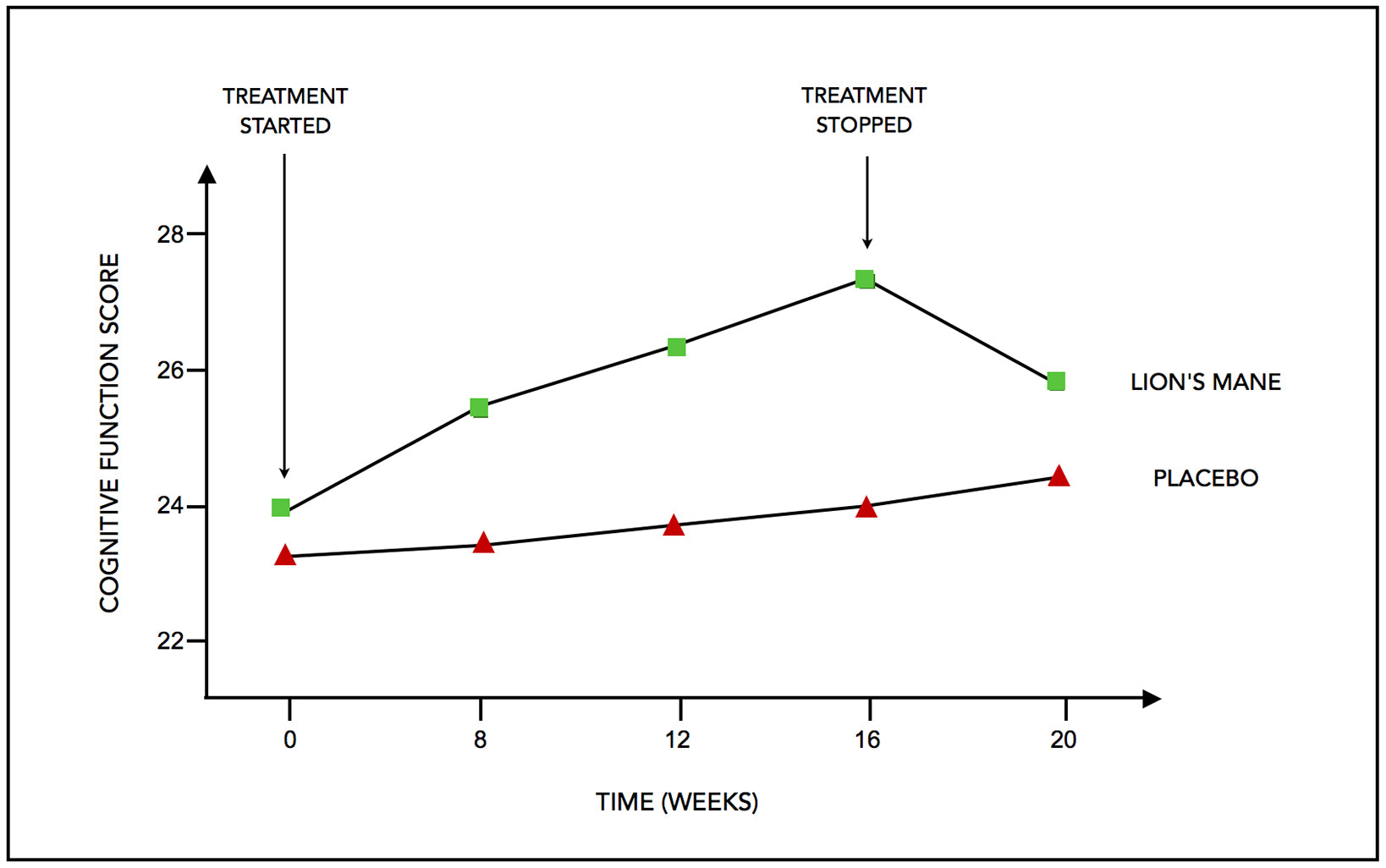THE SCIENCE BEHIND SYNAPTAID®

SYNAPTAID® has been specifically formulated to support healthy brain function and counter the known mechanisms involved in ‘brain ageing’, cognitive impairment and Alzheimer’s disease.
SYNAPTAID’s unique formulation is based on three lines of evidence:
1. INSIGHTS FROM NEUROSCIENCE regarding healthy brain function, as well as the processes known to cause cognitive decline and Alzheimer’s disease.
2. CLINICAL STUDIES - including research into the impact of nutrients and other natural agents on the health and functioning of the brain.
3. CLINICAL EXPERIENCE – specifically, the agents that have been found to reliably bring tangible improvements in cognitive function.
SYNAPTAID´S ACTIVE INGREDIENTS:
Active ingredients in SYNAPTAID® include Lion’s Mane mushroom, cinnamon, folate, vitamin B6, vitamin B12, iodine and vitamin D. Learn more about each of these agents and the evidence for their role in brain health below.
LION’S MANE MUSHROOM
Lion’s Mane mushroom (Hericeum erinaceus) has a long-standing reputation as a brain-supporting agent. SYNAPTAID® contains concentrated Lion’s Mane extracts that contains substances known as ‘hericenones’ and ‘erinacines’. Animals studies show that both these classes of substances have the ability to stimulate the production of what is known as ‘brain-derived neurotrophic factor´ (BDNF) [1,2]. BDNF helps protect against ‘brain atrophy’ (shrinking of the brain during ageing), and promotes ‘neuroplasticity’ (the formation of new connections in the brain to facilitate learning and memory).
Animal studies show that Lion’s Mane has the ability to stimulate regeneration of brain cells – specifically in a part of the brain called the ‘hippocampus’ [3]. The hippocampus is involved in functions such as memory and orientation, and it’s the part of the brain usually most affected in cognitive impairment and Alzheimer’s disease.
In a double-blind, placebo-controlled study in adults diagnosed with ‘mild cognitive impairment’, Lion’s Mane mushroom was found to significantly improve cognitive function [4]. This landmark study showed that cognitive function increased steadily over the 16 weeks study subjects took Lion’s Mane. The supplement was then stopped, after which there was decline in cognitive function over the next four weeks (see figure below).

CINNAMON
Cinnamon is perhaps best known as a culinary spice, though it has a long history of use in traditional medicine. One known effect of cinnamon is its ability to help regulate blood sugar levels and improve the functioning of the hormone insulin [5,6]. This has particular relevance to dementia as raised blood sugar levels and impaired insulin functioning (‘insulin resistance’) have been recognised as a potential cause of Alzheimer’s disease. In fact, in some cases, Alzheimer’s disease is referred to as ‘type 3 diabetes’.
Beyond its ability to counter blood sugar issues, cinnamon has a range of other effects that can support healthy brain function [7]. For example, cinnamon has the ability to combat a potentially damaging biochemical process known as ‘oxidative stress’ (also referred to as ‘free radical damage’), as well as having anti-inflammatory effects. Again, this is important as these processes are implicated in ‘brain fog’, cognitive impairment, and dementia.
Another of cinnamon’s potential benefits relates to its ability to protect against the accumulation of the proteins known as ‘tau’ and ‘beta-amyloid’ that typically ‘gum up’ the brains of those affected by Alzheimer’s disease. For example, in one study in mice induced to have Alzheimer’s disease, cinnamon extract was found not only to significantly reduce beta-amyloid formation, but improve cognitive function considerably, too [8].
In another study, this time in Alzheimer’s disease-affected rats, cinnamon was found to inhibit an enzyme known as ´GSK-3´ - something that would be expected to help reduce deposition of tau and beta-amyloid proteins [9]. This study also found that cinnamon boosted the numbers of cells in the ‘hippocampus’ - the part of the brain most prone to degeneration in Alzheimer’s disease. Crucially, cinnamon was found to improve the learning ability of the animals treated with cinnamon.
Another study found that cinnamon promoted ‘neuroplasticity’ in the hippocampus of mice, and also converted mice described as ‘poor learners’ into ‘good learners’ [10].
Overall, the evidence suggests that cinnamon has a range of effects that support brain health and mitigate processes known to be involved in cognitive impairment and Alzheimer’s disease.
FOLATE, VITAMIN B6 AND VITAMIN B12
The inclusion of these B-vitamins in SYNAPTAID® relates to their known ability to lower levels of the amino acid homocysteine. Higher levels of homocysteine are a known risk factor for cognitive decline and Alzheimer’s disease.
In one study, individuals with cognitive impairment and relatively high levels of homocysteine treated with these three nutrients saw a slowing of brain atrophy over time [11]. Allied research has found that this same treatment regime also improved ‘global cognitive function’ [12].
The research shows that even individuals homocysteine levels in the ‘normal range’ can benefit from supplementation with folate, B6 and B12. It has been suggested that some benefits here may come due some direct effect of one or more of the nutrients, in addition to their ability to lower homocysteine.
IODINE
Iodine is what is known as a ‘trace mineral’ – meaning that it is required in very small dosages. Iodine is known to be essential for healthy cognitive function, and deficiency of this nutrient is recognised as the most common cause mental impairment in the World.
One of iodine’s roles is as an essential element of hormones produced by the thyroid that regulate metabolism and a wide range of processes in the body and brain. For example, iodine assists the production of neurotransmitters (brain chemicals) including serotonin (mood enhancing), acetylcholine (important for cognitive functions including learning and recall) and dopamine (important for mental energy, drive and reward).
Even a mild deficiency of thyroid hormones can impair brain function and lead to issues such as poor memory and concentration and ‘brain fog’.
VITAMIN D
Vitamin D is perhaps best known for its ability to help build and maintain healthy bone. However, vitamin D is, in fact, a hormone, and evidence amassed over the last decade shows it has far-reaching actions that are beneficial to both the body and brain.
One of vitamin D’s actions in the body is to quell inflammation [13], giving it the potential to counter a major driver of cognitive decline and Alzheimer’s disease (‘neuroinflammation’). In addition, vitamin D has been found to increase the clearance of beta-amyloid – one of the proteins which typically affects the brains of people with Alzheimer’s disease [14]. Studies in animals shows that treatment with vitamin D has the capacity to retard and even reverse cognitive issues [15].
In humans, there is a wealth of evidence linking lower levels of vitamin D with increased risk of impaired cognitive function and Alzheimer’s disease [16]. Crucially, vitamin D deficiency and ‘insufficiency’ are extremely common [17,18].
SYNAPTAID® INGREDIENTS:

SCIENTIFIC REFERENCES:
1. Chiu CH, et al. Erinacine A-enriched Hericium erinaceus mycelium produces antidepressant-like effects through modulating BDNF/PI3K/Akt/GSK-3β signaling in mice. Int J Mol Sci 2018;19:341
2. Rupcic Z, et al. Two New Cyathane Diterpenoids from Mycelial Cultures of the Medicinal Mushroom Hericium erinaceus and the Rare Species, Hericium flagellum. Int J Mol Sci. 2018;19(3)
3. Ratto D, et al. Hericium erinaceus Improves Recognition Memory and Induces Hippocampal and Cerebellar Neurogenesis in Frail Mice during Aging. Nutrients 2019;11(4)
4. Mori K, et al. Improving effects of the mushroom Yamabushitake (Hericium erinaceus) on mild cognitive impairment: a double-blind placebo-controlled clinical trial. Phytother Res 2009;23(3):367-72
5. Santos HO, et al. To what extent does cinnamon administration improve the glycemic and lipid profiles? Clin Nutr ESPEN. 2018;27:1-9
6. Deyno S, et al. Efficacy and safety of cinnamon in type 2 diabetes mellitus and pre-diabetes patients: A meta-analysis and meta-regression. Diabetes Res Clin Pract. 2019;156:107815
7. Momtaz S, et al. Cinnamon, a promising prospect towards Alzheimer's disease. Pharmacol Res. 2018;130:241-258
8. Frydman-Marom A, et al. Orally administrated cinnamon extract reduces β-amyloid oligomerization and corrects cognitive impairment in Alzheimer's disease animal models. PLoS One. 2011;6(1):e16564
9. Madhavadas S, et al. Cognition enhancing effect of the aqueous extract of Cinnamomum zeylanicum on non-transgenic Alzheimer's disease rat model: Biochemical, histological, and behavioural studies. Nutr Neurosci. 2017;20(9):526-537
10. Modi KK, et al. Cinnamon Converts Poor Learning Mice to Good Learners: Implications for Memory Improvement. J Neuroimmune Pharmacol. 2016;11(4):693-707
11. Smith AD, et al. Homocysteine-lowering by B vitamins slows the rate of accelerated brain atrophy in mild cognitive impairment: a randomized controlled trial. PLoS One 2010;5(9):e12244.
12. de Jager CA, et al. Cognitive and clinical outcomes of homocysteine-lowering B-vitamin treatment in mild cognitive impairment: a randomized controlled trial. Int J Geriatr Psychiatry 2012;27(6):592-600
13. Lefebvre d'Hellencourt C, et al. Vitamin D3 inhibits proinflammatory cytokines and nitric oxide production by the EOC13 microglial cell line. J Neurosci Res. 2003;71(4):575-82
14. Masoumi A, et al. 1alpha, 25-dihydroxyvitamin D3 interacts with curcuminoids to stimulate amyloid-beta clearance by macrophages of Alzheimer's disease patients. J Alzheimers Dis 2009;17(3):703-17
15. Durk MR, et al. 1alpha,25-Dihydroxyvitamin D3 reduces cerebral amyloid-beta accumulation and improves cognition in mouse models of Alzheimer’s disease. J Neurosci 2014;34:7091-7101
16. Balion C, et al. Vitamin D, cognition, and dementia: a systematic review and meta-analysis. Neurology 2012;79(13):1397-405
17. Hyppönen E, et al. Hypovitaminosis D in British adults at age 45 y: nationwide cohort study of dietary and lifestyle predictors. Am J Clin Nutr 2007;85(3):860-8
18. Hilger J, et al. A systematic review of vitamin D status in populations worldwide. Br J Nutr. 2014;111(1):23-45
ABOUT SYNAPTAID´S CREATOR

Dr John Briffa BSc MB BS is an award-winning medical doctor, educator and author of 9 health books. He is a leading authority on the use of lifestyle change and supplementation for the optimisation of health and wellbeing.
Dr Briffa has a particular interest in the brain and cognitive health, and has formulated SYNAPTAID® on the basis of the best available science, as well as his work in clinical practice over some 30 years.
